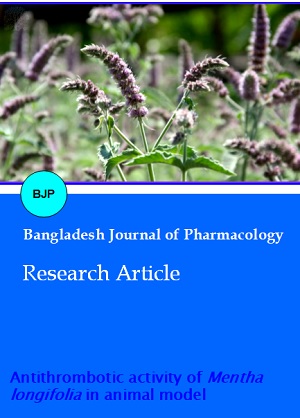Antithrombotic activity of Mentha longifolia in animal model
DOI:
https://doi.org/10.3329/bjp.v13i1.33243Abstract
The present research work was conducted to appraise the antithrombotic activity of Mentha longifolia using in vitro and in vivo experiments. Aqueous methanolic (70:30) extract produced significant (p<0.01-0.001) and dose-dependent increase in in vitro blood clotting time, bleeding time, prothrombin time and activated partial thromboplastin level with maximum effect at highest concentration. While in in vivo experiment, aqueous methanol extract showed noteworthy (p<0.01-0.001) prolongation in bleeding time and clotting time after 30, 60 and 90 min of administration except for 25 mg/kg at 30 min which is non-significant. Moreover, plant extract exhibited considerable increase (p<0.1-0.001) in bleeding time, clotting time, prothrombin time as well as activated partial thromboplastin time in rabbits after seven days of treatment. Additionally, HPLC analysis of M. longifolia aqueous methanolic extract illustrated the presence of various valuable phytoconstituents. In a nutshell, M. longifolia possesses potential antithrombotic activity and hence systematically proved to be beneficial in patients with vascular diseases.
Downloads
131
165 Read
43

Published
How to Cite
Issue
Section
License
Authors who publish with this journal agree to the following terms:
- Authors retain copyright and grant the journal right of first publication with the work simultaneously licensed under a Creative Commons Attribution License that allows others to share the work with an acknowledgement of the work's authorship and initial publication in this journal.
- Authors are able to enter into separate, additional contractual arrangements for the non-exclusive distribution of the journal's published version of the work (e.g., post it to an institutional repository or publish it in a book), with an acknowledgement of its initial publication in this journal.
- Authors are permitted and encouraged to post their work online (e.g., in institutional repositories or on their website) prior to and during the submission process, as it can lead to productive exchanges, as well as earlier and greater citation of published work (See The Effect of Open Access).
